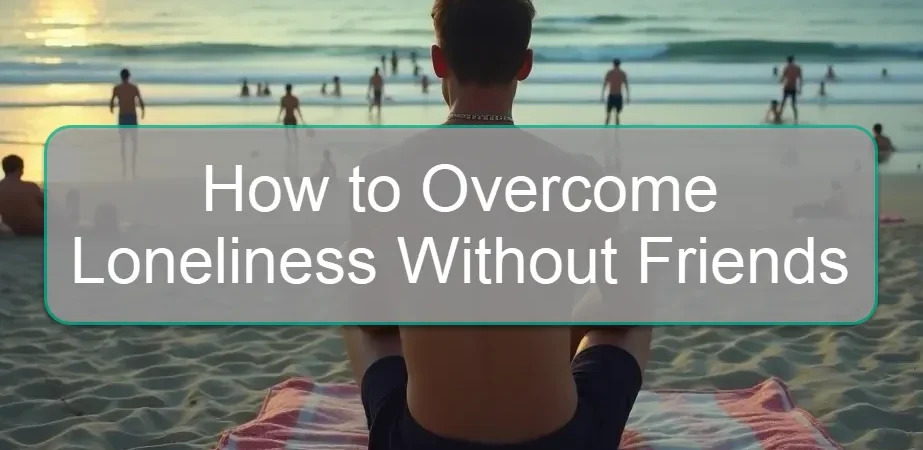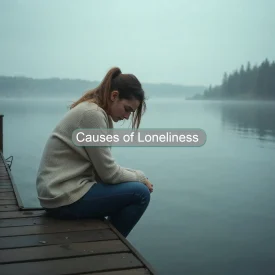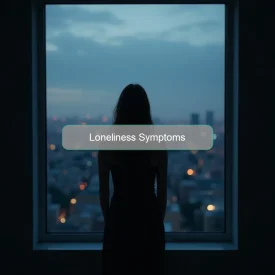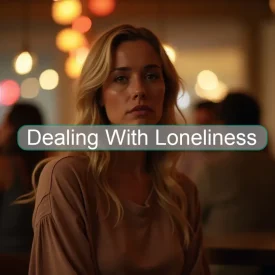Feeling lonely without friends can be very hard, but you can overcome it by turning your focus inward. Start by building a strong relationship with yourself. Practice self-compassion, do activities you enjoy alone, and take care of your physical and mental health. These steps will help you feel more empowered, reducing loneliness over time.
Remember, loneliness is normal and not permanent. To overcome loneliness without friends, create daily routines like mindfulness, hobbies, or spending time with a pet. These help you feel connected even when you’re alone. With steady effort, you will learn to enjoy your own company and become stronger emotionally.
Key Takeaways:
- Be kind to yourself, use positive thoughts, and set goals to feel more independent.
- Do fun solo activities like reading, hiking, or crafts to stay busy and happy.
- Exercise, eat well, sleep enough, practice mindfulness, and be thankful to boost mood.
- Find comfort with pets, plants, or AI companions without needing people around.
- If loneliness stays, get help from a therapist or online support.
How Loneliness Affects You Without Friends
Loneliness harms more than your mood—it increases risks of heart disease, stroke, diabetes, depression, anxiety, and can shorten your life like smoking 15 cigarettes a day. It also weakens immunity, raises blood pressure, and affects mental health.
Knowing this shows why it’s important to take action to overcome loneliness even without friends. For a deeper understanding, explore loneliness meaning and its broader implications on daily life.
Strategies to Overcome Loneliness Without Friends
You can overcome loneliness even without friends by using simple and helpful ways to feel better. These include taking care of yourself, doing activities you enjoy, and changing how you think. Keep doing them, and you will feel better over time.

Cultivating Self-Love and Self-Companionship
Loving yourself is important to deal with loneliness on your own. It means being kind to yourself and seeing alone time as a chance to grow. Try to do small things every day that help you feel good inside. This helps you feel less need for others to make you happy.
- Practicing Self-Compassion and Positive Affirmations
Self-compassion means being kind to yourself during tough moments, like you’d treat a friend. Repeat affirmations such as “I am worthy of happiness” to counter negative thoughts. Studies show this lowers loneliness by easing psychological distress. Try a simple exercise where you write three things you appreciate about yourself each day.
- Building a Strong Relationship with Yourself
Spend intentional time alone to discover your likes and dislikes. Journal or meditate to deepen self-understanding. This builds confidence, making solitude feel comforting rather than empty.
- Embracing Independence and Personal Growth
View independence as a strength. Set small challenges, like trying a new skill, to foster growth. Over time, this shifts loneliness into empowering self-reliance.
- Setting Personal Boundaries and Goals
Establish boundaries to protect your energy, such as limiting draining habits. Set achievable goals, like reading a book weekly, to create purpose and track progress.
Engaging in Solo Activities to Fill Your Time
Solo activities provide distraction and fulfillment. They turn alone time into productive, enjoyable moments. Choose ones that match your interests for maximum benefit.

- Exploring Hobbies and Creative Outlets Alone
Pick up painting, knitting, or playing an instrument. These spark creativity and a sense of accomplishment. Start small by dedicating 15 minutes daily to build momentum.
- Reading, Writing, and Intellectual Pursuits
Dive into books or start a journal. Reading transports you to new worlds, while writing helps process emotions. Both reduce isolation by engaging your mind deeply.
- Outdoor Adventures and Nature-Based Activities
Go for walks, hikes, or cycling alone. Nature boosts mood and reduces feelings of loneliness. Observe your surroundings mindfully to feel more connected to the world.
- Home-Based Projects and DIY Crafts
Try cooking new recipes or organizing your space. These hands-on tasks create satisfaction and structure.
Prioritizing Physical Health to Combat Loneliness

Taking care of your body helps your feelings, too. Moving your body regularly can fight feeling lonely because it releases chemicals called endorphins that make you feel happier, even if you’re alone. When you exercise, eat well, and get enough rest, it creates a good cycle that helps you feel less lonely over time.
Try to move for at least 30 minutes every day. This can be walking, dancing, stretching, or any exercise you like. Moving more can lower your chance of feeling lonely by 15-30%. Pick activities you enjoy so it feels fun, not like a chore.
Eating healthy helps your mood, too. Eat balanced meals with lots of fruits, vegetables, and healthy fats from fish or nuts. This keeps your energy and mood steady. Try to avoid too much sugar because it can make you crash and feel worse.
Sleep is very important for feeling less lonely. Aim for 7-9 hours each night. When you sleep well, your mind and body recharge, and you handle emotions better. You can make a bedtime routine like dimming lights or reading something relaxing to help you fall asleep.
Yoga or gentle exercises that focus on breathing are great, too. They reduce stress and help you relax. You can do yoga alone at home and follow easy beginner videos to feel comfortable.
In short: move your body, eat healthy, sleep well, and try relaxing exercises. These things help your body and mind feel better, which can lower loneliness.
Nurturing Mental and Emotional Well-Being

Mental habits can help create inner calm and change how you see loneliness. They remind you that loneliness is only temporary and can get better. Doing these practices every day can make a big difference over time.
One helpful way is to practice mindfulness, which means paying attention to what’s happening right now. Meditation can also help by letting you gently understand your feelings of loneliness. Starting with just 5 minutes a day is a good way to begin.
Another simple practice is to write down three things you are thankful for each day. This helps shift your mind away from what you don’t have and towards the good things in your life. Doing this regularly can stop negative thoughts from taking over.
Using Technology Mindfully

Technology can help your mental health without making you rely on others socially. Use it as a tool to grow and learn, rather than for comparing yourself to others. Focus on the positive ways it can support you.
For instance, exploring an AI girlfriend can offer you constant virtual companionship that’s always there when you need support, helping to ease feelings of loneliness and provide comfort anytime. Curious about this tech? Learn more in What is an AI girlfriend and how it might fit into your routine.
You can take free online courses to learn new skills and feel more confident. Also, exploring virtual reality or solo video games can be fun and immersive experiences that don’t require social interaction but still offer enjoyment.
Using technology mindfully this way can reduce loneliness by keeping you engaged and focused on your own growth and fun, without the negative side of social comparison or pressure.
Adopting a Pet or Plant Care for Companionship Alternatives
Non-human companions like pets or plants can help ease loneliness by providing comfort and a sense of connection. Pets offer affection and help create daily routines, while caring for plants gives a calming, rewarding focus.

Both can make you feel less alone and bring warmth to your everyday life.
- Benefits of Pet Ownership for Loneliness Relief
Pets reduce stress, lower blood pressure, and ease isolation. Dogs especially boost mood and encourage activity.
- Plant Parenting and Gardening as Therapeutic Activities
Caring for plants is calming and low-commitment.
- Low-Maintenance Options for Beginners
Start with succulents or fish. They require minimal effort.
Long-Term Strategies for Sustainable Well-Being
Building habits over time is essential for lasting happiness and reduced loneliness. Focus on consistent actions like daily self-care to create a sense of ongoing fulfillment. These strategies help you maintain well-being even during tough periods.
Long-term approaches prevent loneliness from returning by strengthening your inner resources. To address root issues, consider reviewing the causes of loneliness to tailor your habits more effectively.

- Developing a Daily Routine for Structure and Purpose: Create a simple schedule with set times for meals, exercise, and hobbies to add stability to your day.
Routines provide purpose by giving you something to look forward to, reducing feelings of emptiness.
- Pursuing Personal Development and Lifelong Learning: Commit to reading books or taking online courses regularly to foster personal growth. Learning new things keeps your mind engaged and builds confidence in your abilities.
Set goals like finishing one course per month to track your progress. This habit turns solitude into an opportunity for self-improvement and reduces isolation over time.
- Building Resilience Against Future Loneliness Episodes: Practice coping skills like positive self-talk to bounce back quicker from lonely moments. Engage in activities that boost cognitive function, such as puzzles or meditation, to strengthen mental resilience. Stay active physically and mentally to create a buffer against future isolation.
- Measuring Progress and Adjusting Your Approach: Track your mood weekly in a journal to see improvements and spot patterns. Note what strategies work best, like exercise or hobbies, and adjust as needed.
Celebrate small wins to stay motivated on your journey. Regular check-ins ensure your methods stay effective for long-term well-being.
Seek Professional Help When Needed
Sometimes, loneliness doesn’t fade on its own, even after trying personal strategies. In these cases, reaching out to mental health experts is a smart step. They offer personalized guidance based on your unique situation. Professional help can uncover deeper issues and provide tools for lasting change.

Types of Therapy for Overcoming Loneliness
Cognitive behavioral therapy (CBT) is a popular option that helps reframe negative thoughts about being alone. It targets patterns that keep loneliness going, like self-doubt or avoidance.
Group therapy builds social skills in a low-pressure way, without needing to form close friendships right away. Other therapies, like mindfulness-based approaches, can also reduce isolation by improving emotional awareness.
Online Counseling and Support Resources
Online therapy makes professional support easy and accessible from home. Many services connect you with licensed therapists through video, chat, or messaging.
There are also free or low-cost options like apps and community hotlines for immediate help. Always check reviews to find a reputable service that suits your needs.
When to Consult a Mental Health Professional
Reach out if loneliness affects your daily routine, like work or sleep. Signs include ongoing sadness, anxiety, or physical health changes. If you’re looking to identify warning signs early, check out common loneliness symptoms to better understand your emotions.
Don’t wait for it to worsen—early help prevents bigger issues like depression. A doctor or counselor can assess if it’s time for more support.
Group Therapy Alternatives without Direct Friendships
Join virtual support groups focused on skill-building, like coping workshops. These emphasize learning over personal bonding, reducing pressure.
Online forums or classes on mindfulness can provide connection through shared topics. Activities like art or exercise groups offer interaction without deep commitments.
Conclusion: Finding Strength and Joy in Your Own Company
Overcoming loneliness without friends is possible when you choose to focus on yourself and your growth. By caring for your mind and body, trying new activities, and building healthy habits, you can turn solitude into a source of strength and happiness.
Remember, being alone does not mean being lonely—your relationship with yourself can become your greatest support. Embrace this journey as an opportunity to discover your inner resilience and live a fulfilling, joyful life on your own terms.
Frequently Asked Questions
How do you beat loneliness when you have no friends?
You can beat loneliness by loving yourself, doing activities alone like hobbies or walks, staying healthy with exercise and good food, and practicing mindfulness or gratitude. Keeping routines and having pets, or using helpful technology, can also make you feel better over time.
Is loneliness harmful to your health, and why should you address it?
Yes, loneliness can hurt your health by raising the risks of heart problems, depression, anxiety, and weaker immunity. It can even shorten your life like smoking does. Taking care of yourself early helps prevent these problems and makes you stronger emotionally.
When should you seek professional help for loneliness?
Get professional help if loneliness doesn’t improve, disrupts your daily life, or causes ongoing sadness and anxiety. Therapies and online counseling can give you tools to feel better and stop loneliness from getting worse.





